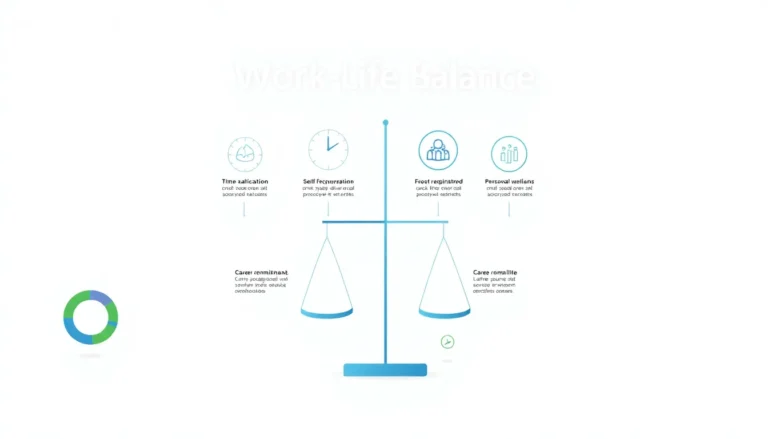Table of Contents
ToggleIn a world where Monday mornings feel like a cruel joke, job happiness has become the Holy Grail for many. Imagine waking up excited to tackle the day instead of hitting the snooze button for the fifth time. It’s not just a dream; it’s a reality some lucky folks have discovered. They know that a happy workplace can turn even the most mundane tasks into a thrilling adventure—like turning spreadsheets into a treasure map.
Understanding Job Happiness
Job happiness represents the emotional well-being employees feel regarding their work. It involves satisfaction and fulfillment, elements that significantly impact productivity.
Definition of Job Happiness
Job happiness entails a positive emotional response to work, incorporating factors like job satisfaction, engagement, and morale. Workers experiencing job happiness typically report feeling motivated and connected to their tasks. Characteristics defining this concept include work environment, relationships with colleagues and management, and opportunities for personal growth. These elements contribute to overall well-being in the workplace.
Importance of Job Happiness
Job happiness fosters a productive and dynamic work culture. Employees who feel fulfilled tend to outperform their less-happy counterparts, leading to improved organizational performance. Increased job happiness reduces turnover rates, as satisfied employees are less likely to seek new opportunities. Enhanced morale creates a positive feedback loop, driving collaboration and innovation. Companies demonstrating a commitment to employee happiness attract top talent and benefit from enhanced reputations in their respective industries.
Factors Influencing Job Happiness

Job happiness hinges on several critical factors that shape the employee experience. Understanding these elements can lead to improved workplace dynamics and better employee retention.
Work Environment
A positive work environment boosts job satisfaction. Natural light, ergonomic furniture, and organized spaces contribute to comfort and productivity. Colors and decor can impact mood, making the workplace visually appealing. Flexible workspaces encourage collaboration while also accommodating privacy needs. These physical aspects foster an atmosphere where employees feel valued and engaged. Companies prioritizing these conditions see higher levels of job happiness among their workforce.
Relationships with Colleagues
Strong relationships with colleagues enhance job happiness significantly. Trust and camaraderie create a sense of belonging, making daily tasks more enjoyable. Team bonding activities and open communication channels promote collaboration and understanding. These connections help mitigate stress and foster a supportive network, encouraging employees to share ideas and feedback. Organizations that nurture positive relationships among team members witness increased morale and loyalty, translating to a more dynamic and innovative workplace.
Benefits of Job Happiness
Job happiness presents numerous advantages for both employees and organizations. It plays a crucial role in enhancing overall workplace performance and individual well-being.
Enhanced Productivity
Employees experiencing job happiness often exhibit greater productivity. Motivation increases when individuals feel valued and engaged in their work. Companies that cultivate positive environments report significant boosts in output—up to 25%. High morale leads to focused efforts, enabling workers to complete tasks more efficiently and effectively. Collaboration thrives in joyous settings, encouraging team members to share ideas freely. Employers benefit from this synergy, resulting in innovative solutions and continuous improvement.
Improved Mental Health
Job happiness contributes significantly to improved mental health. Lower stress levels and increased job satisfaction foster resilience. Employees with positive experiences often experience fewer episodes of anxiety and depression. Statistics indicate that happy workers take 10 times fewer sick days compared to dissatisfied counterparts. Supportive work cultures promote work-life balance, allowing individuals to recharge. These aspects lead to a healthier work environment that nurtures both emotional and physical well-being.
Strategies to Boost Job Happiness
Enhancing job happiness requires intentional strategies. Fostering a supportive environment and setting clear personal objectives plays a crucial role in achieving this goal.
Fostering Positive Work Culture
Creating a positive work culture forms the foundation for job happiness. Employers should promote open communication, allowing employees to express thoughts freely. Encouraging teamwork builds connection and trust, making work enjoyable. Recognition of achievements, big and small, boosts morale significantly. Employers who invest in employee well-being create spaces filled with positivity. Implementing regular team-building activities strengthens relationships, which in turn enhances collaboration. Companies that prioritize these cultural elements often experience lower turnover rates and improved employee satisfaction.
Setting Personal Goals
Setting personal goals helps individuals find purpose in their work. Employees can outline specific, achievable objectives that align with their career aspirations. Regularly reviewing these goals keeps motivation high and progress in focus. Different success markers, such as skills development and project completion, reinforce a sense of accomplishment. Achieving personal goals contributes to overall job satisfaction. Managers who support employees’ ambitions and provide resources facilitate this process effectively. Employees who feel empowered in their roles are more engaged and committed to their teams.
Job happiness is more than just a feel-good concept; it’s a vital component of a thriving workplace. When employees feel fulfilled and engaged, productivity soars and innovation flourishes. Organizations that prioritize a positive work environment and strong relationships foster a culture where employees can thrive.
By implementing strategies that promote open communication and personal growth, companies can create a supportive atmosphere that enhances job satisfaction. Ultimately, investing in job happiness not only benefits employees but also drives organizational success. A happy workforce leads to reduced turnover and a reputation that attracts top talent. Embracing the importance of job happiness is a win-win for everyone involved.







